Star Wars: The Old Republic preview
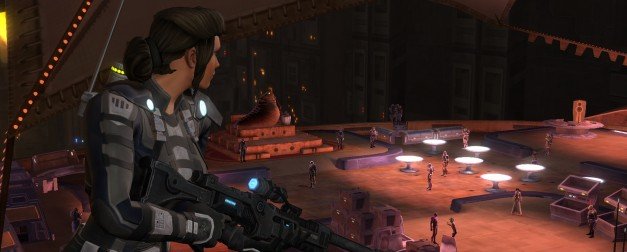
I am a hero, sat in a room full of heroes. The Old Republic is a massively multiplayer game that starts by condensing down, aiming to deliver an experience comparable to a single-player RPG. Then, once the quests and dialogue and twists and moral choices are in place, its overlaid with the trappings of an MMO: the groups, the clans, and the promise of glorious, shiny loot.
During the first fourteen hours of the game, the former seems to win a powerful victory over the latter. Every single person has their own story, and it's at this stage in the game that BioWare want you to buy into their quest.
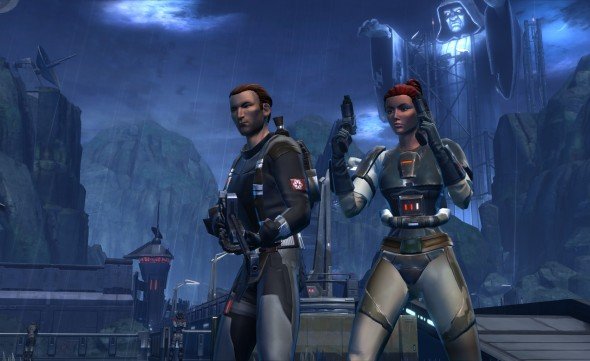
To that aim, TOR is a success. An hour with my character (an Imperial Agent), and I had more of a sense of him as my character than I've ever had with an MMO. My Agent was closer to the RPG hero of BioWare and Bethesda games than MMO heroes: outside of RP servers, often little more than vessels for skills. My Agent was sympathetic to a Hutt's right-hand man, cold to his money-grabbing usurper, and genuinely remorseful when I had to betray him. I could've approached the situation differently – chiding the guy for his trusting naivety – but the outcome would've been similar. The game's starting planets are launchpads for galactic exploration and story-forging, so your trajectory is somewhat fixed. Still, you take the lessons you learn and the memories of the people you insult off-world with you – some of which may come back to bite you in the blue-toned rear end in your later levels.
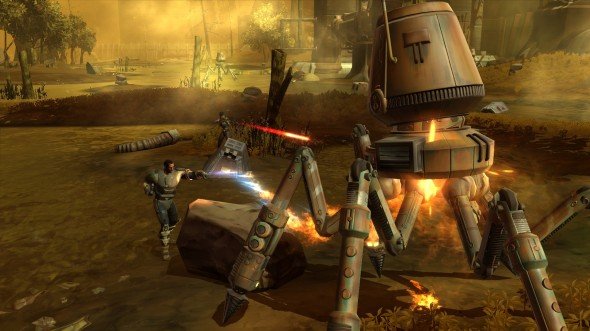
The Old Republic's story – where everyone has a life-altering personal quest - would be torture to implement in any kind of context. If you're an Agent, every Agent you see has been told by the same handler you have that only they have the ability to complete the mission. That setup isn't far off other MMOs – you have to save my X from ten rampaging Ys! - but The Old Republic's quests are multi-tiered things, incorporating kill and fetch quests into more creative and engaging missions. Your actions force people off-world, result in deaths, relationships breakdowns, and the fate of your chosen faction across the whole sector. Like BioWare's approach to character, the plot is epic and fluid in a way more typically seen in single-player RPGs – just with a gang of human-controlled avatars sprinting in and out of your peripheral vision.
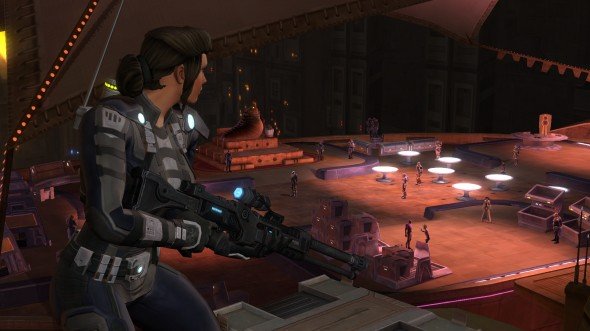
There's a slight disconnect between the Old Republic's flavours of RPG. Seven hours into the game, and I was feeling lonely. I'd been levelling Imperial Agent in London (Tom, meanwhile, had played as a Bounty Hunter a few days before at BioWare's Austin studio, and had found little cause for human interaction. In a bid for some contact – be it human, Twi'Lek, or blue-skinned, red-eyed Chiss – I took to hanging around outside a bar (one of the game's quest hubs), trying to find a friend to go adventuring.
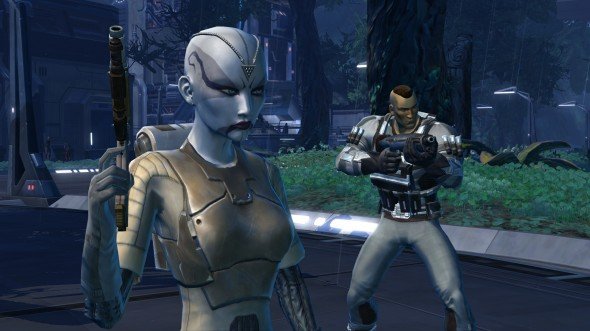
The Agent shares their first planet with the Bounty Hunter. Hutta (shedding the 'Nal' prefix common in the galaxy's later lore) is the home of the Hutts: giant slug-men, as well you know, with a propensity for organised crime. Both classes have a good reason to be planetside: the Bounty Hunter wants to earn his/her Bounty Hunting stripes in a hunting contest. I – as Chiss Imperial Agent – was aiming to get the support of the region's fattest slugs to make life easier for the Sith Empire.
The Imperial Agent is suave, cold, and ruthlessly calculating, voice acted to perfection by a conspicuously clipped-tone Brit (remember: in Star Wars, the British are evil. In real life, we're more chaotic neutral). It felt a little strange to take my character – one who consciously flies under radars to complete covert jobs – and make him hop up and down outside a pub, pleading for friends.
Keep up to date with the most important stories and the best deals, as picked by the PC Gamer team.
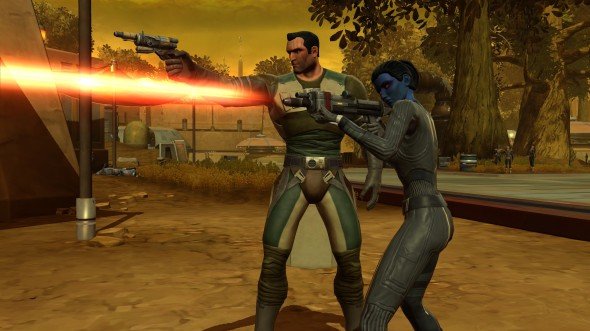
Eventually, after countless players averted their eyes from the strange bouncing man, I found a buddy. Following him out into the wilderness, we got down to killing. For all the Old Republic's character focus, it's not above a 'kill X things' quest. The Imperial Agent's first set of missions are riddled with these jobs: kill five bandits, murder seven rogue droids. What they lack in creativity, they make up in tutorial: the Agent's skill-set is more complex than the stand-and-shoot Bounty Hunter, or the stand-and-stab Jedi Knight (the other two classes I've played). The Agent's best suited in cover, and comes pre-loaded with a skill that, when activated, launches him behind the nearest hard surface. It's not a perfect system – the game sometimes pushes you against a wall facing the enemy – but it clicks well with the Agent's other long-range skills, and makes thematic sense. Aup to level 10, my Imperial Agent had the same skillset as every other Imperial Agent in the room. Skills are bought via a trainer, but not specialised: gain a level and you unlock one ability. Reaching level 11 allows you to specialise to an extent: I got to choose between Commando and Sniper as my secondary class, with the former acting like a typical rogue and focusing on invisible backstabs, as the latter dealt long-range damage. But leaping down these skill-paths didn't bust the game open. Instead, all Agent Snipers continued to get the same Agent Sniper skills as each other, at least up to the level 14 I reached.
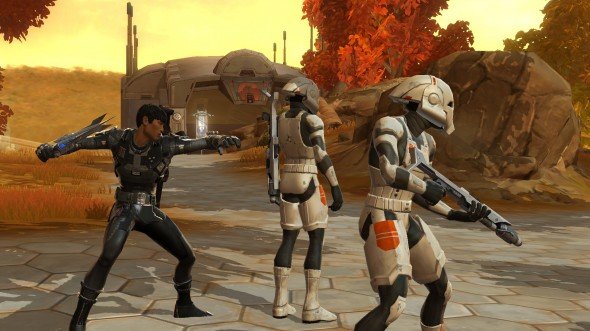
Of the skills I did get, I got on best with 'suppressing fire.' Aiming at a mid-range target and tapping the skill launched a steady stream of blaster bolts, powerful enough to knock most of the health bar off three clumped enemies. For longer range engagements, I'd use 'snipe': a second or two of aiming, and my Agent would launch a well-aimed blaster shot at an opponent's neck. Close-up, my tactic involved more gibbering and sprinting away: the Agent's built for ranged damage.
Myself and my new chum had grouped up soon after meeting, but he was playing an Agent too. Our attempts to share quests on Hutta went slightly awry: trying to coordinate our actions and quests after a few hours levelling separately became more trouble than it was worth. We soon split up, agreeing to meet again later for more murdering. I spoke to Daniel Erickson – the game's lead writer – about the lack of group activities on the first planet. He explained that Hutta, like all of TOR's starting planets, is built largely for solo play.
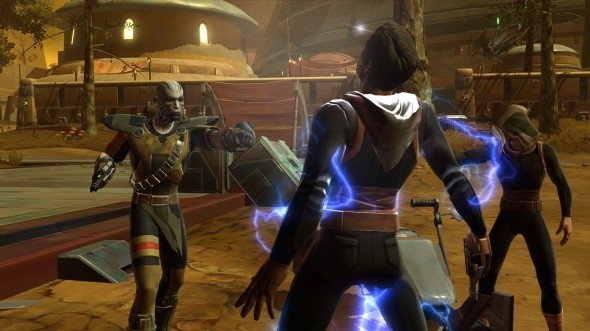
Across the fourteen hours I played, that sensation was fairly constant. The next planet – the dark jungle world of Dromund Kaas – had many more opportunities for group play. But buddying up felt more like a distraction than a goal, time taken away from my own progression to help someone else see the revelations I was missing out on. It made more sense to save my group play to the game's 'flashpoints' – something Tom covers in detail in his magazine preview – and become the solo hero the first part of the game is keen for you to be. How that translates to the late game is yet to be seen. Daniel suggested that a lot of players, instead of sticking around in their existing skin, will switch class and see the galaxy from another perspective. The range of stories open to different classes means many who would otherwise be tempted to stick around at the level cap may well do just that.

